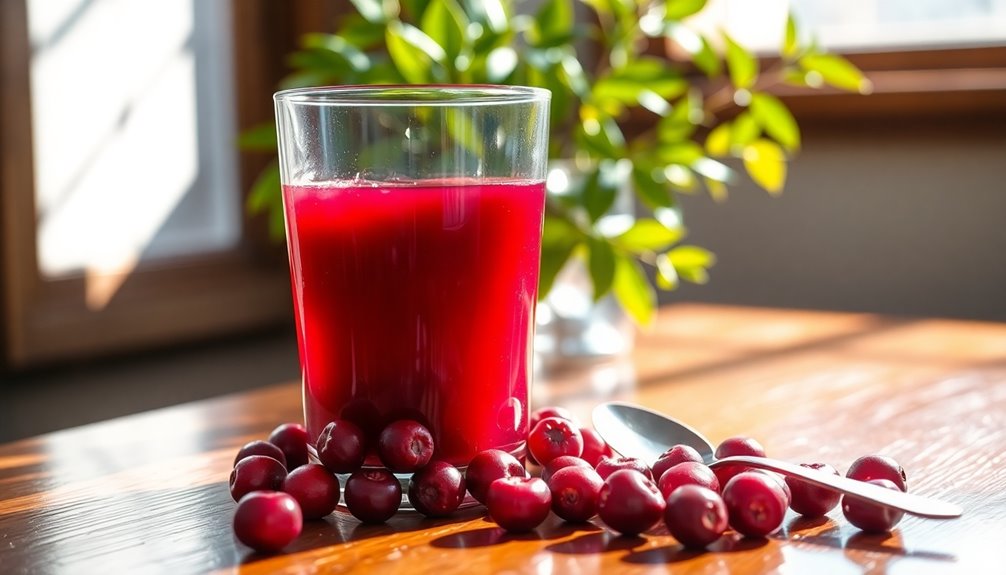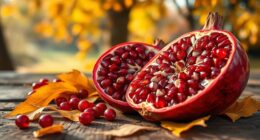Cranberry juice can be a surprisingly effective remedy for constipation. Its hydrating properties help soften stools, making them easier to pass. The fiber content in cranberry juice supports regular bowel movements as well. Plus, it's packed with antioxidants that promote overall health. So, if you're looking for a tasty way to relieve constipation, cranberry juice is worth a try. There's even more to discover about its health benefits, so keep exploring!
Key Takeaways
- Cranberry juice helps soften stools and promotes hydration, which is essential for relieving constipation.
- Its high vitamin C content supports overall digestive health and can aid in regular bowel movements.
- The antioxidants in cranberry juice help reduce inflammation, potentially alleviating constipation symptoms.
- Regular consumption can promote gut microbiota balance, which is crucial for maintaining digestive health.
- Staying hydrated with cranberry juice encourages better bowel function, making it a beneficial addition to a constipation relief diet.
What Is Constipation?
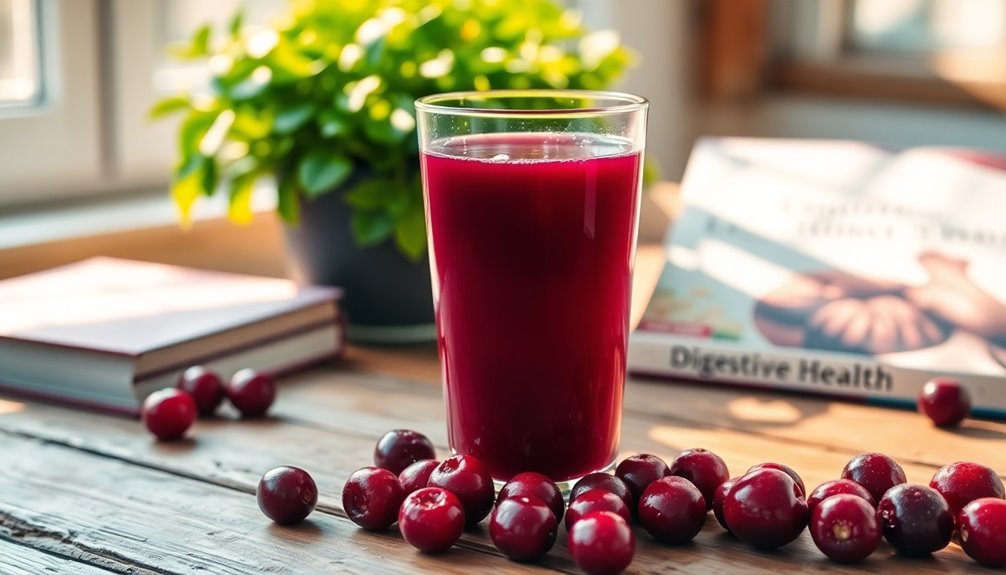
Constipation can be a frustrating condition that affects your daily life.
It's defined as having fewer than three bowel movements per week, often leading to hard stools and a feeling of incomplete evacuation. While normal bowel movement frequency varies widely among individuals, a lack of dietary fiber and hydration can greatly contribute to constipation.
You might also experience it alongside other digestive conditions. Maintaining a healthy gut bacteria balance is essential for regularity, and dietary adjustments, like incorporating cranberry juice, may offer health benefits.
If you're struggling with constipation, it's important to seek medical advice to explore the best treatment options tailored to your needs.
How Common Is Constipation?
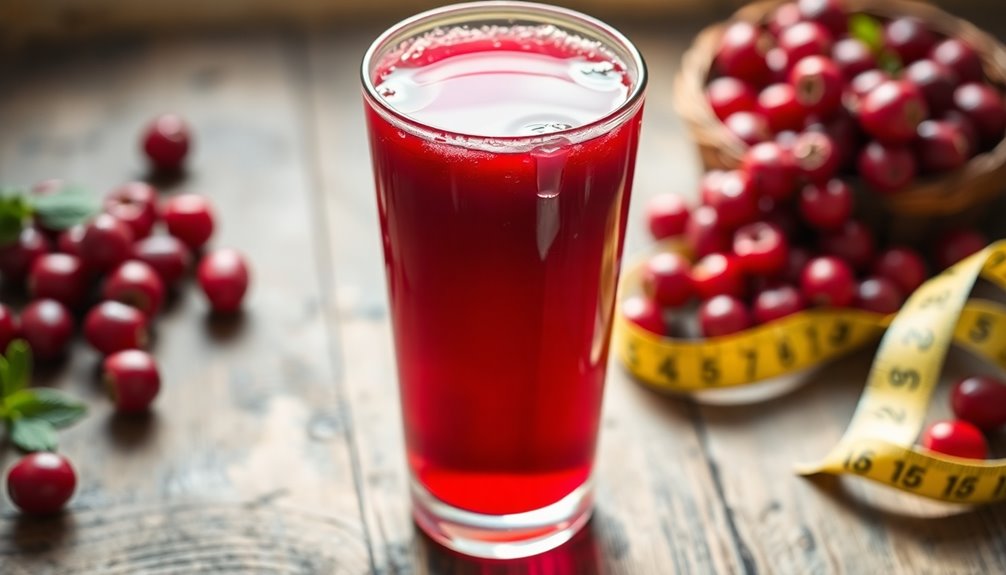
Constipation is more common than you might think, affecting about 16% of adults in the U.S.
If you're over 60, your chances increase to around 33%.
Both men and women face this issue, but women, especially during pregnancy or after childbirth, are particularly at risk.
Prevalence in Adults
Many adults grapple with gastrointestinal discomfort, and constipation stands out as a particularly common issue. In the U.S., about 16% of adults experience constipation symptoms, leading to over 2.5 million doctor visits annually.
You might be surprised to learn that low fiber intake is a significant contributor to this gastrointestinal issue. Other causes of constipation can include certain medications and lifestyle choices.
Here are some common factors that might affect you:
- Low fiber intake
- Certain medications (like calcium and opioids)
- Dehydration
- Lack of physical activity
- Stress
Incorporating cranberry juice into your diet might help relieve constipation by adding moisture to the stool and promoting healthy bacteria, showcasing its health benefits.
Age and Gender Factors
Understanding the factors that contribute to constipation can help you recognize its prevalence across different demographics. Approximately 16% of adults in the U.S. experience constipation, but that number jumps to about 33% for those over 60.
Gender plays a role too; women, especially during pregnancy or postpartum, are more prone to constipation than men. Low fiber intake and physical inactivity greatly impact your GI tract health, increasing your risk across various age groups.
Furthermore, certain populations, particularly non-Caucasian groups, may face higher rates of constipation. This issue is often linked to insufficient vitamins and minerals and conditions like irritable bowel syndrome (IBS), making it essential to address these factors in your diet and lifestyle. Additionally, nutritional deficiencies can exacerbate gastrointestinal issues, highlighting the importance of a balanced diet.
Who Gets Constipated?
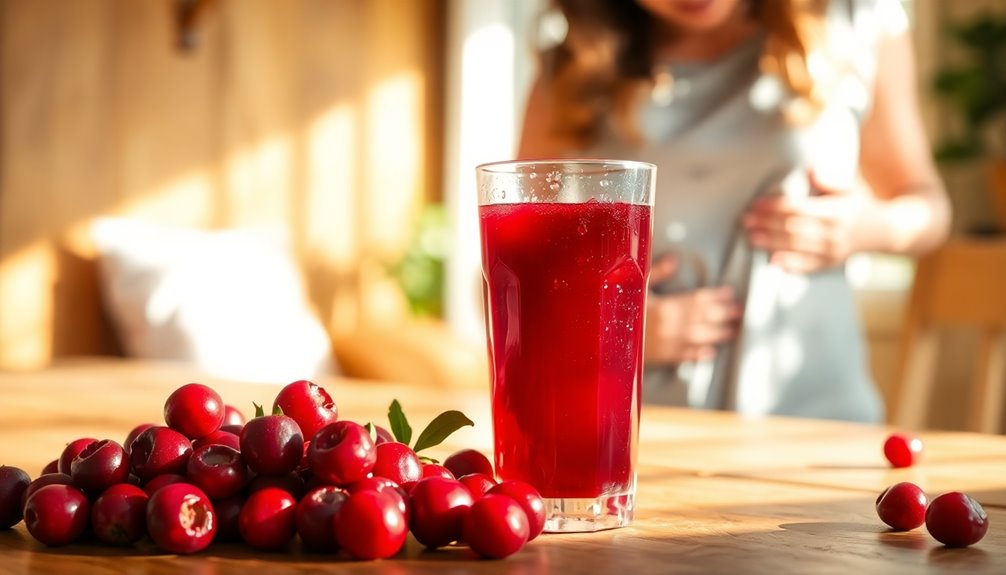
You might be surprised to learn that about 16% of adults in the U.S. deal with constipation, and that number jumps to 33% for those over 60.
Women, especially during pregnancy or after giving birth, often face increased risks due to hormonal changes.
Additionally, your dietary habits play a significant role, as low fiber intake can contribute to constipation across all age groups.
Demographic Factors Influencing Constipation
While various factors contribute to the risk of constipation, certain demographic groups are particularly vulnerable. Understanding these groups can help you identify if you or someone you know might need relief.
- Women, especially during pregnancy or postpartum
- Adults over 60, with 33% experiencing symptoms
- Non-Caucasian populations, potentially facing higher rates
- Individuals with low fiber intake, regardless of age or gender
- Those on medications like opioids, calcium, or iron supplements
If you're among these demographic groups, it's important to consult healthcare providers about your symptoms. Bilateral hearing loss can also impact overall health, which may indirectly affect conditions like constipation.
Cranberry juice might aid in preventing urinary tract infections, but focusing on fiber intake and regular bowel movements is vital for managing constipation effectively.
Dietary Habits and Constipation
Dietary habits play an essential role in determining who gets constipated. If you have a low fiber intake, you're more likely to experience constipation, as fiber helps increase stool bulk and promotes regular bowel movements.
Many adults, especially women and older individuals, find themselves struggling with this issue. Certain medications, like iron supplements and opioids, can exacerbate the problem.
Remarkably, non-Caucasian populations may face higher rates of constipation, highlighting how varied dietary habits influence bowel health.
Incorporating juices, particularly cranberry products, into your diet can be beneficial, as they contain compounds that may support healthy bacteria in the large intestine. Additionally, juices like beet juice can enhance blood flow, which may also contribute to improved digestive health.
As a health writer, I encourage you to examine your dietary choices to combat constipation effectively.
The Causes of Constipation
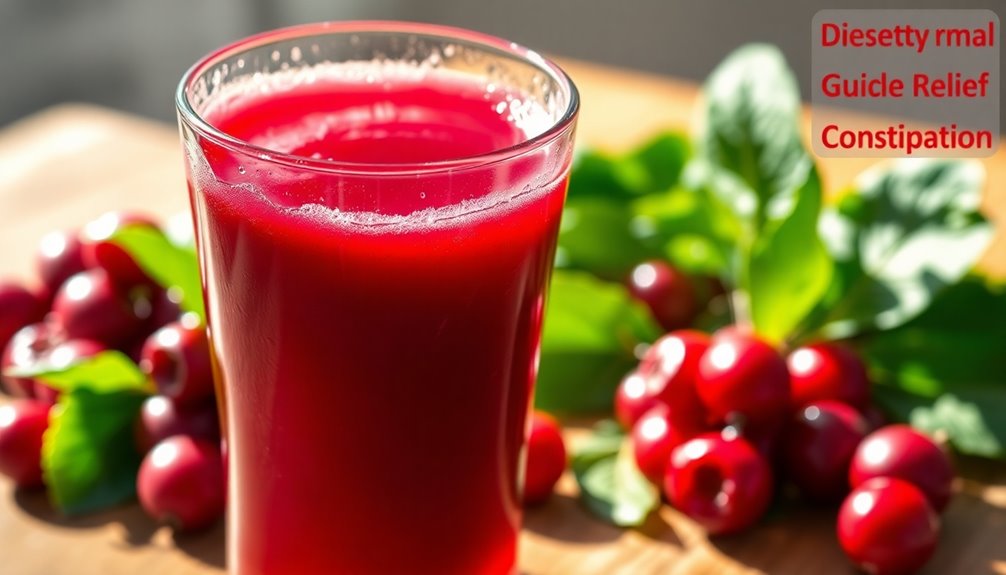
Constipation can stem from various factors, with dietary fiber being a primary culprit. When you don't get enough fiber, your stool can become hard and difficult to pass.
Other causes include:
- Dehydration: Not drinking enough water leads to dry, hard stools.
- Physical inactivity: A sedentary lifestyle slows gut motility, making bowel movements harder.
- Medications: Certain drugs, like opioids or iron supplements, can cause constipation as a side effect.
- Hormonal changes: Fluctuations during pregnancy can hinder digestion and increase constipation risk.
Understanding these causes can help you manage constipation better.
If you're looking for relief, cranberry juice might be worth considering, as it can aid digestion and hydration!
How to Relieve Constipation
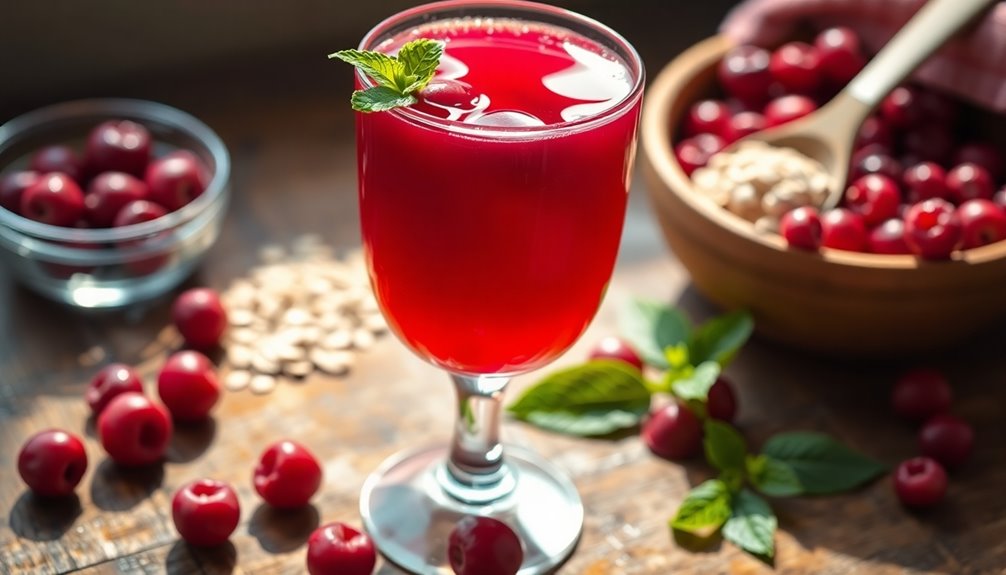
To relieve constipation effectively, you'll want to focus on a combination of hydration, diet, and physical activity.
Start by drinking cranberry juice, as it can help soften stools and promote regular bowel movements through proper hydration.
Incorporate high-fiber foods like fruits, vegetables, and whole grains into your meals to increase stool bulk and support digestion.
Regular physical activity is essential too; engaging in exercise stimulates gut motility, alleviating constipation symptoms.
If your fiber intake isn't sufficient, consider fiber supplements to reach the recommended 25-30 grams per day.
Additionally, adding probiotics and prebiotics to your routine can support gut health and enhance bowel regularity, making them a valuable part of your constipation management strategy.
Can Cranberry Juice Relieve Constipation?
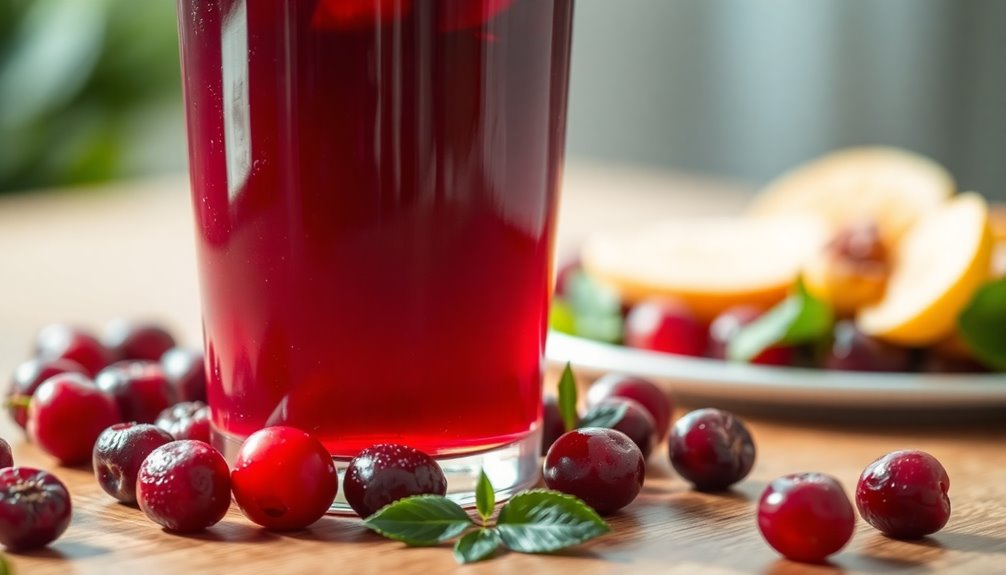
Could cranberry juice really help relieve constipation? Yes, it can! The high liquid content in cranberry juice helps maintain hydration and softens stools, which is vital for easing constipation symptoms. Additionally, cranberry juice can help promote the growth of beneficial gut bacteria, enhancing your digestive health. Here are some key benefits:
- Increases fluid intake, essential for preventing constipation
- Contains antioxidants that may reduce harmful gut bacteria
- Supports improved bowel function and regularity
- Offers a delicious way to stay hydrated
- Complements a high-fiber diet for ideal relief
Moreover, incorporating chia seeds into your diet can further aid in promoting digestive health due to their high fiber content. While it's not a fiber powerhouse, incorporating cranberry juice into your routine can be a tasty part of your strategy for better digestive health.
Other Health Benefits of Cranberry Juice
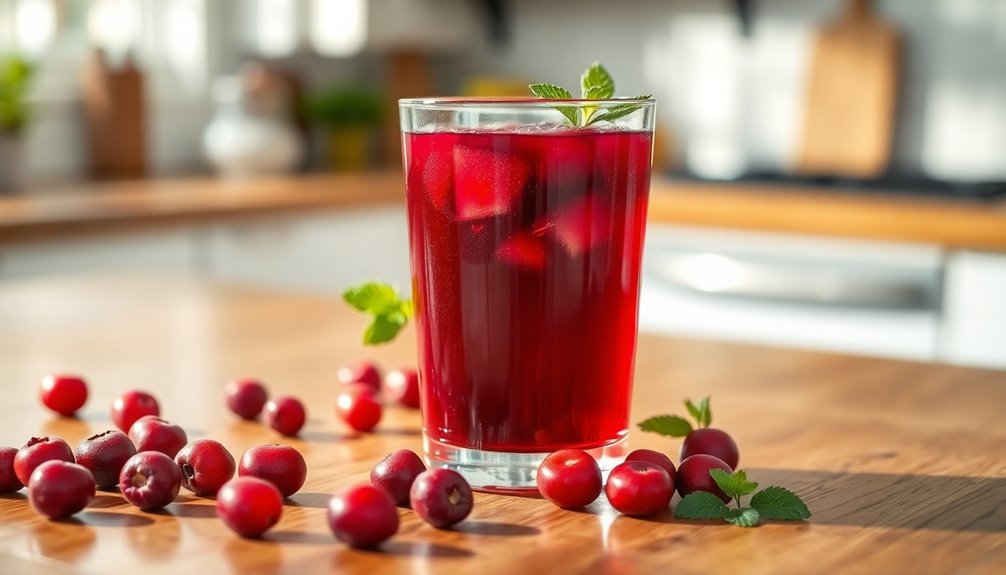
Cranberry juice isn’t just a flavorful drink; it’s packed with health benefits that can enhance your overall well-being. One of the notable advantages is its potential to support urinary tract health, thanks to its rich content of antioxidants. Additionally, studies have suggested that cranberry juice and weight loss benefits may be linked, as it can help curb appetite while providing essential vitamins and nutrients. Incorporating cranberry juice into your diet might just be a delicious way to promote a healthier lifestyle.
Rich in antioxidants, it provides 26% of your daily vitamin C and 20% of vitamin E per 8 oz serving, supporting skin and heart health. Its proanthocyanidins may help prevent urinary tract infections (UTIs) by stopping harmful bacteria like E. coli from adhering to bladder cells.
Regular consumption promotes digestive health by supporting gut microbiota and reducing inflammation, which can alleviate constipation.
Additionally, cranberry juice can improve cardiovascular health by lowering cholesterol levels and blood pressure.
Plus, its natural compounds strengthen your immune system, helping your body effectively combat infections and illnesses.
Enjoy cranberry juice for a healthier you!
Frequently Asked Questions
Does Cranberry Juice Relieve Constipation?
Cranberry juice can indeed relieve constipation. Its high liquid content helps hydrate your body and soften stools, making them easier to pass.
The salicylic acid in cranberry juice encourages the growth of beneficial gut bacteria, which boosts your digestive health. By increasing your fluid intake, cranberry juice enhances stool movement through the digestive tract.
However, for the best results, pair it with a diet rich in fiber and additional hydration.
What Is the Best Thing to Drink to Have a Bowel Movement?
When you're looking for the best drink to encourage a bowel movement, hydration is key.
Consider sipping on warm water, herbal teas, or even prune juice, which contains natural sorbitol that can help stimulate your digestive system.
If you're up for it, a high-fiber smoothie loaded with ingredients like spinach and flaxseeds can also work wonders.
What Simple Trick Empties Your Bowels?
Ever wonder how a simple trick can leave you feeling lighter? Staying hydrated is key! Drinking plenty of water, along with adding fiber-rich foods to your diet, can work wonders.
You might also try warm lemon water first thing in the morning; it kickstarts digestion. Additionally, regular physical activity helps get things moving.
What Is Best for Instant Constipation Relief?
For instant constipation relief, you should try drinking plenty of fluids like water and juices, which can soften your stools.
Eating high-fiber foods, such as fruits and whole grains, is essential too.
Consider engaging in regular physical activity like walking to stimulate your gut.
If you need a quicker fix, over-the-counter fiber supplements or probiotics can help encourage bowel movements.
Stay consistent with these strategies for lasting results!
Conclusion
In conclusion, if you're struggling with constipation, cranberry juice might just be your unexpected ally, like a gentle breeze on a hot day. Its natural properties can help ease your discomfort and promote regularity. Remember, it's always good to combine it with a balanced diet and plenty of water for the best results. So, sip on that cranberry juice and let it work its magic, bringing you relief and a happier gut!
Cindy thoroughly researches juicing trends, techniques, and recipes to provide readers with practical advice and inspiration. Her writing style is accessible, engaging, and designed to make complex concepts easy to understand. Cindy’s dedication to promoting the advantages of juicing shines through her work, empowering readers to make positive changes in their lives through the simple act of juicing.

